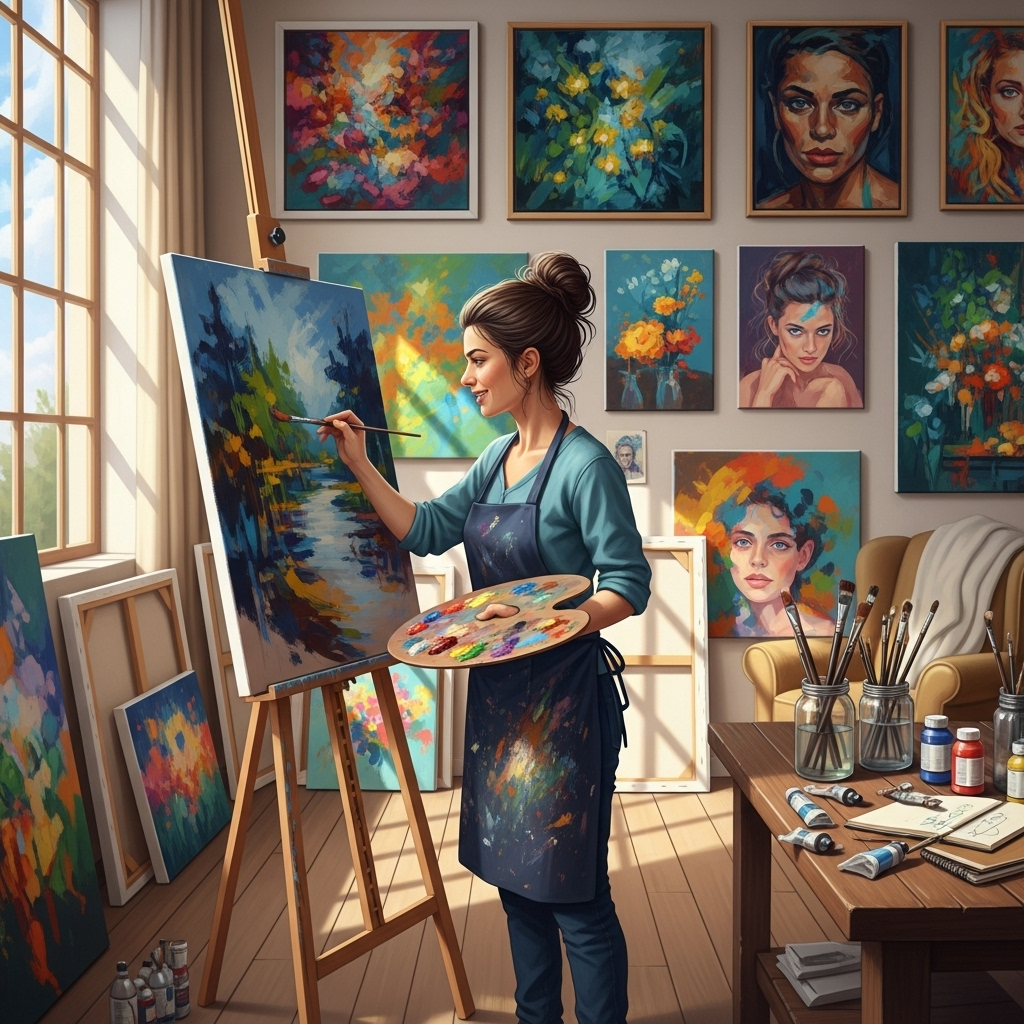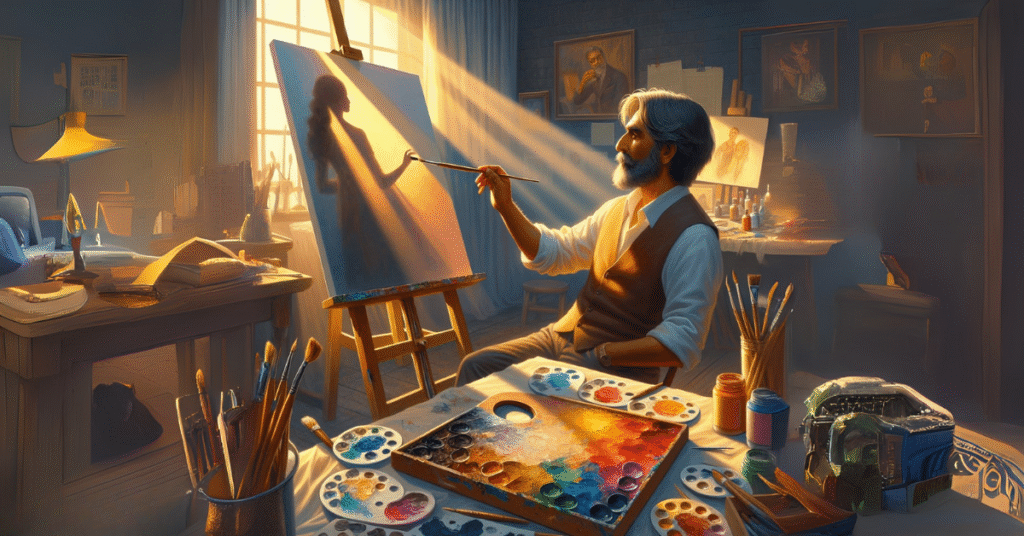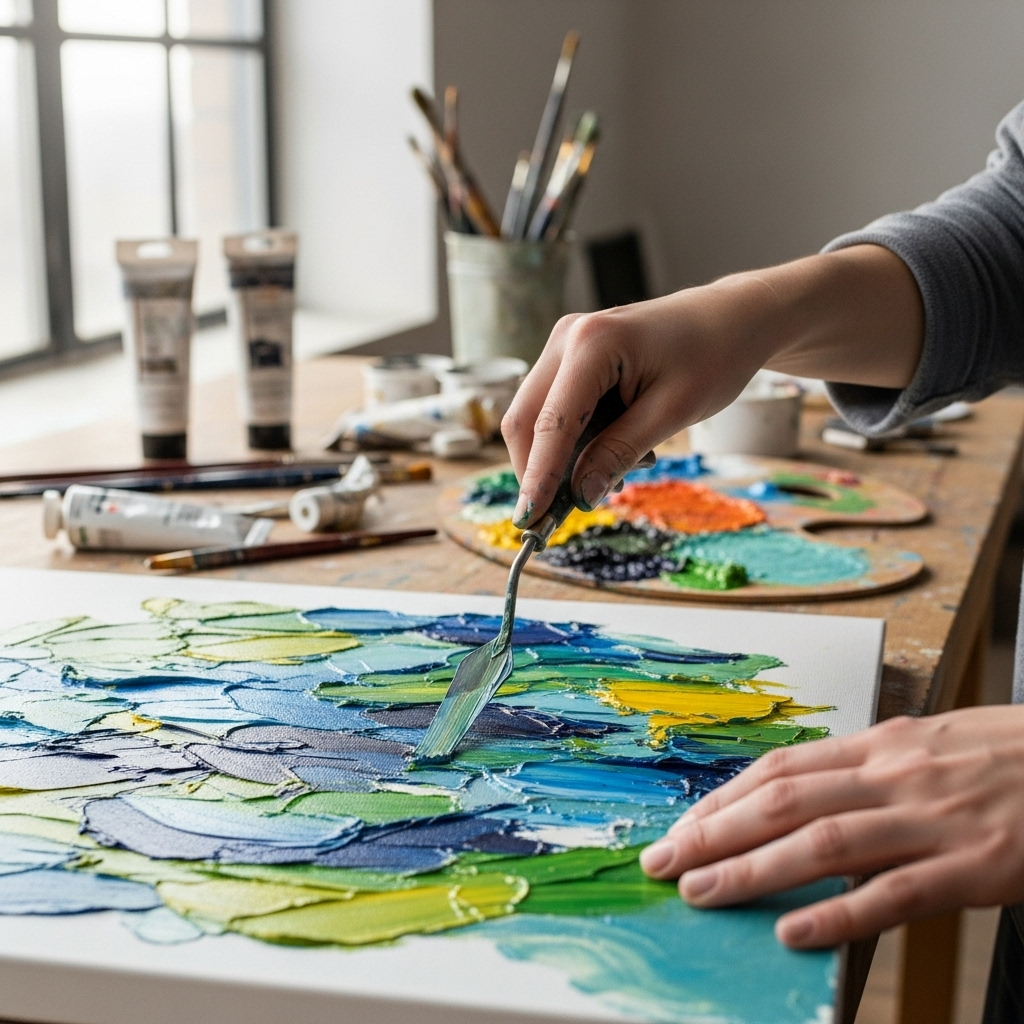
Your artistic journey is deeply personal and uniquely yours. In a world filled with trends, comparisons, and external expectations, one quality stands out as the foundation of meaningful creative work: authenticity. Whether you’re just beginning your artistic practice or refining your craft after years, embracing authenticity is not merely beneficial—it’s essential for creating art that truly matters.
What Does Authenticity in Art Really Mean?

Authenticity in art means staying true to yourself, uninfluenced by fleeting trends or others’ expectations. It’s about creating work that resonates with your inner world, reflecting your experiences, beliefs, and unique perspective. Authenticity encompasses originality, honesty, and integrity, ensuring that your artwork remains true to your personal vision rather than conforming to commercial pressures or what you think “good art” should look like.dianamezen+1
Think of authenticity as giving yourself permission to express your truth through your chosen medium. It’s not about being perfect or technically flawless—it’s about being genuinely you. An artist might not be the most technically proficient, but genuine expression can imbue their work with a powerful, intangible quality that captivates audiences far more effectively than skillful imitation ever could.juliebevanart
Why Your Authentic Voice Matters

Building Deeper Connections with Your Audience
When you create authentically, viewers can sense that you’ve poured your true self into every piece. This emotional honesty creates a bond that transcends the canvas, drawing people into your world and transforming casual viewers into devoted followers. Authentic art resonates more deeply because it speaks to something real within both the artist and the observer.dianamezen+1
Establishing Your Unique Artistic Identity
Your authentic voice is what sets your work apart in a crowded marketplace. It allows you to develop a distinct artistic identity that becomes recognizable over time—your signature approach, your preferred color palette, your thematic concerns, your unique way of seeing the world. This distinctiveness cannot be manufactured; it emerges only when you stop trying to mimic others and start innovating from your own truth.juliebevanart+1
Fostering Creative Freedom and Innovation
Authenticity encourages you to explore new ideas and push creative boundaries without fear of judgment. By staying true to your unique perspective and life experiences, you create space for innovation and fresh artistic contributions. This freedom from the need to conform unlocks your creative potential in ways that imitation never can.dianamezen
Improving Your Well-being
Beyond the artistic realm, authenticity is good for your soul and your health. When you express your true self through art, you experience greater happiness, reduced stress, and improved emotional resilience. This sense of alignment between your inner truth and your outer expression creates a powerful sense of wholeness and purpose in your creative practice.artoffreedom
The Challenge: Navigating External Pressures

The art world is filled with trends, critiques, and expectations that can sway your artistic vision. Social media showcases trending styles, galleries favor certain aesthetics, and commercial pressures tempt you toward creating what sells rather than what matters to you.juliebevanart
Many artists unconsciously gravitate toward a visual library of “good art”—often Old Master paintings or contemporary work they admire—and find their own imagery struggling to emerge from beneath these influences. This is a common and understandable challenge, but it prevents your authentic voice from flowering.lorimcnee
Similarly, the trap of imitation can feel comfortable. Learning from other artists is valuable, but relying too heavily on mimicking their styles causes you to lose your unique voice. Authenticity emerges only when you move beyond imitation and start innovating.juliebevanart
How to Cultivate Authenticity in Your Artistic Practice

Embrace Your Unique Perspective
Your perspective is shaped by your life experiences, cultural background, beliefs, and worldview. These elements are irreplaceable and invaluable. Rather than hiding them, use them as the starting point for your creative work. What makes you curious? What issues or ideas do you care deeply about? What life experiences have shaped who you are? Channel these into your art.2lilowls+1
Experiment Fearlessly with Different Mediums and Styles
Don’t limit yourself to one medium or approach. Trying new materials, techniques, and subjects helps you discover what genuinely resonates with you. This exploration is not wasted time—it’s essential discovery work that clarifies your authentic preferences and inclinations.2lilowls
Create Intentionally and Narrow Your Focus
While experimentation is important, so is commitment. Choose a few themes—whether that’s specific colors, subjects, moods, or mediums—and create a series within that focused scope. This constraint paradoxically allows your natural style to develop more distinctly. Repetition within a chosen direction builds mastery and clarity of your voice.josielewis
Study and Learn from Others (Wisely)
Make a list of artworks and artists that genuinely move you. What specifically draws you to their work? Is it their line quality, color choices, subject matter, or emotional tone? Study these elements to understand your own preferences. However, learn from many sources rather than copying one artist heavily, as this blend of influences creates richness without the risk of plagiarism.josielewis+1
Practice Reflection and Self-Awareness
Regularly reflect on your work and your creative journey. Journal about what you enjoy in your art and what feels forced. Revisit your earliest creative passions—the subjects or styles that excited you before life’s demands pulled your attention elsewhere. These often contain seeds of your most authentic expression.lorimcnee+1
Allow Vulnerability in Your Work
Authenticity requires emotional honesty and vulnerability. This can feel daunting, but it’s crucial for creating art that connects with others. When you share your truths through your art, you invite others into your world and create meaningful engagement.juliebevanart
Share Your Work and Remain True to Feedback
While it’s important to receive feedback and gain new perspectives, remember that your vision and authentic voice must ultimately guide your decisions. Feedback is a tool for growth, not a mandate to abandon your personal vision.2lilowls
The Evolution of Authenticity

Authenticity doesn’t mean stagnation. Your authentic voice will naturally evolve as you grow, learn, and change. Your experiences, skills, and perspectives will deepen over time, and your art will reflect this evolution. The key is maintaining consistency in your core values and vision while allowing room for genuine growth and artistic exploration.fiveable
Think of a child learning to speak—they don’t overthink finding their “voice.” They simply want to communicate, and their unique voice emerges naturally through genuine expression. Similarly, you already possess an authentic voice; your task is simply to trust it enough to let it emerge in your work.rosefredrick
Moving Forward

Your artistic journey is an invitation to profound self-discovery and authentic expression. In a world that often rewards conformity and commercial appeal, your commitment to authenticity becomes an act of courage and integrity. When you create from your truth—drawing on your unique experiences, perspectives, and passions—your work transcends mere technical skill and becomes a genuine gift to the world.
So embrace your unique vision. Stay true to yourself amid external noise. Trust your instincts. Create from your heart. Your authenticity is not just valuable; it’s irreplaceable. The art world needs what only you can create.
10 sources
